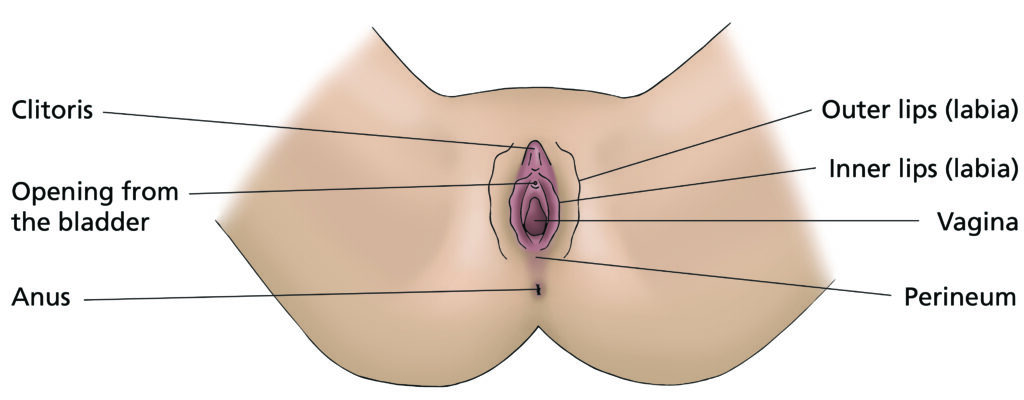What do we mean by the vulva?
The vulva is the name of the area around the opening of the vagina. The vulval skin is very sensitive. It can react to irritants such as soaps and other substances that can cause allergies. To protect the vulval skin and to improve your symptoms the following simple steps are important.

Changes in vulval skin
What to look for:
- Any changes in the colour of the vulval skin such as whitening or an increase in skin pigmentation.
- Any thickening of the skin such as warts or skin tags.
- Any ulcers or sores in the skin.
- Any symptoms of persistent itching or soreness.
Washing
- Avoid all contact with soap as this dries and irritates the skin. You may find it beneficial to wash your hair separately from the rest of your body as shampoo can irritate vulval skin.
- Use a soap substitute such as Aqueous cream, Cetraben, Hydromol, E45 wash or Dermol 500 for washing. A small amount of the cream is applied to the skin with water and then washed off. This will leave the skin feeling less dry and irritated than using soap or water alone. It can be used anywhere on the body.
- Avoid using hard, scratchy flannels for washing the vulva and use your hand to apply. Dab the vulval area gently to dry or try using a hair dryer on a cool setting and hold well away from the skin.
- Avoid washing too often, once a day is usually adequate. Avoid bubble bath or other additives in your bath.
- Avoid contact with non-prescribed over-the-counter preparations, which might make your skin condition worse.
- Avoid perfumes and personal deodorants. Wet wipes of any sort can be very irritating and should be avoided.
Clothing
Always wear loose fitting underwear. Try to avoid tight outer garments such as cycling shorts or tight leggings. On the whole, cotton underwear tends to be less irritating than synthetic ones. You may find it more comfortable to wear long skirts and no underwear at home.
Avoid washing underwear in biological washing powders. Wash and rinse these items separately from your main wash.
Moisturisers
Hydromol/Diprobase/Aqueous cream /Sudocrem/Zinc and Castor Oil/E45 can be used as moisturisers at any time of the day. These products can be bought over the counter. Keep moisturisers in the fridge and dab on to cool and soothe the skin as necessary.
These products can also be helpful and soothing for cleaning the anal area after a bowel motion. Apply to toilet tissue before use and it can help to ease the “scratchy feeling” toilet tissue has on sensitive and damaged skin.
Is there anything else I should know?
If you enjoy playing sports or taking part in fitness activities, these can be normally continued. Activities that put direct pressure on the vulva, such as horse riding and cycling, are likely to make your symptoms worse. We would advise that you take off wet bathing suites or sweaty exercise clothing as soon as possible.
Some people find protecting their vulva with a moisturiser before exercise helpful.
Many people with vulval conditions find it impacts on their sex life. Some find it embarrassing to speak about sexual dysfunction. We would encourage you to talk to your doctor, who should be able to recommend treatments to help you.
Try a natural lubricant if sex is painful to start with, Yes and Sylk also work well.
There are many websites where you can find more information, some examples are the:
Advice following a vulval biopsy
- You have had a local anaesthetic for this which will have made the area numb, some discomfort may be experienced as the feeling returns and the area may be sore for a day or two.
- A pain relief such as paracetamol may ease this. Always follow the directions of the painkiller you are using.
- It is important to keep the area clean and dry, and you may bath and shower as normal. Do not add salt, Dettol, savlon or anything perfumed.
- To dry the area, use a soft towel and dab yourself gently or use a hairdryer on a cool setting. Do not rub the area.
- If silver nitrate (chemical cautery) was used, rather than a stitch, you will experience a black, flaky discharge for a few days. You will have been given a vasoline type dressing to protect your skin. This will probably drop off when you go to the toilet.
- If you have had a stitch, it will dissolve and does not normally have to be removed. If however it is uncomfortable, it can be removed after a few days.
- If treatment to the vulva is required (WLE) this could be performed either in clinic or under a general anaesthetic.
Advice after Wide Local Excision (WLE) of the vulva
It is important to keep the wound to the vulva clean. Showering is recommended, just water to the area and gently pat dry with a soft clean towel. Do not use bath salts, talcum powder or soap as this can irritate the skin.
It is important to rest following your procedure to allow yourself time to heal but also to walk gently around to remain mobile.
You will gradually go back to your usual routine over the next few weeks but ensure no heavy lifting, bending or stretching takes place in order not to put strain on the wound.
You should wait six weeks before returning to any sexual activity to ensure you are fully healed. If you have pain, take pain relief as advised.
In the unlikely event of any problems, such as severe pain or bleeding, you can contact: